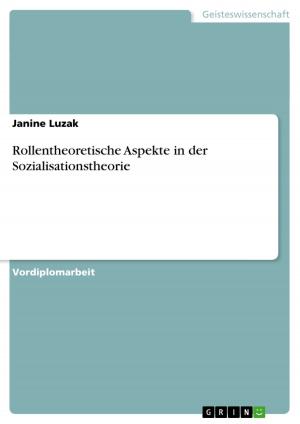The smallest Polish minority - The Karaims
The Karaims
Nonfiction, Social & Cultural Studies, Social Science, Sociology, Marriage & Family| Author: | Philipp Schär | ISBN: | 9783638605281 |
| Publisher: | GRIN Verlag | Publication: | January 31, 2007 |
| Imprint: | GRIN Verlag | Language: | English |
| Author: | Philipp Schär |
| ISBN: | 9783638605281 |
| Publisher: | GRIN Verlag |
| Publication: | January 31, 2007 |
| Imprint: | GRIN Verlag |
| Language: | English |
Seminar paper from the year 2006 in the subject Sociology - Religion, grade: 5 (Erasmus), which is escellent, University of Wroclaw, course: Languages and Nations in East-Central Europe in the 21st Century, 8 entries in the bibliography, language: English, abstract: If one concerns oneself in Polish and Eastern European minorities and if one looks at the numbers of different minority groups, one group at the end of the list catches ones eye: The Karaim, or Karaites. This minority group exists, depending on the source, of only 40-50 people. The name differs, in some sources they are called Karaim, in others Karaites. In the following chapters I will call them Karaim, as I found out during my research, that they call themselves Karaim or in Eastern Europe also Qaray. Moreover, Karaim is also closer to its origin, but more about this in one of the following chapters. Polands Karaims had since centuries disliked to be called Karaites, as it meant 'black dog'. Very special is the Karaim's religion, Judaism as they are ethnically turks Poland is a ethnically most homogenious state, which was not always so in Poland' s history. Poles are with 99,3 % the Majority. The different Minorities in Poland are, according to the 2002 census: Among ethnic groups Silesians and Germans are the largest minorities, 172.6 thousand of Polish citizens declare Silesian national identity and 147.1 thousand, German. The third and the fourth linguistic minorities are, respectively, Belorussians, 47.6 thousand, and Ukrainians, 27.2 thousand. The Gypsies appear in fifth position with 12.7 thousand. They are followed by the historical minorities which number from 5 to 10 thousand people: Ruthenians/Lemkos- 5.8 thousand, Lithuanians - 5.6 thousand, and Kashbus - 5.1 thousand. Next there are minor communities like Russians - 3.2 thousand, Slovaks (1.7 thousand), Jews (1.1 thousand), Tartars (0.5 thousand), Czechs (0.4 thousand), Armenians (0.3 thousand) and in last place the Karaim with only 50. At this point I must add, that other sources mention other numbers. Some only 40, others 150. Karaim Judaism is a Jewish denomination characterized by reliance on the Tanakh as the sole scripture, and rejection of the Oral Law (the Mishnah and the Talmud) as halakha (Legally Binding, i.e. required religious practice). The word Karaim comes from the Hebrew word ???????? (Q?raim), meaning 'Readers (of Scripture)'. This name was chosen by the adherents of Karaim Judaism to distinguish themselves from the adherents of Rabbinic Judaism.
Seminar paper from the year 2006 in the subject Sociology - Religion, grade: 5 (Erasmus), which is escellent, University of Wroclaw, course: Languages and Nations in East-Central Europe in the 21st Century, 8 entries in the bibliography, language: English, abstract: If one concerns oneself in Polish and Eastern European minorities and if one looks at the numbers of different minority groups, one group at the end of the list catches ones eye: The Karaim, or Karaites. This minority group exists, depending on the source, of only 40-50 people. The name differs, in some sources they are called Karaim, in others Karaites. In the following chapters I will call them Karaim, as I found out during my research, that they call themselves Karaim or in Eastern Europe also Qaray. Moreover, Karaim is also closer to its origin, but more about this in one of the following chapters. Polands Karaims had since centuries disliked to be called Karaites, as it meant 'black dog'. Very special is the Karaim's religion, Judaism as they are ethnically turks Poland is a ethnically most homogenious state, which was not always so in Poland' s history. Poles are with 99,3 % the Majority. The different Minorities in Poland are, according to the 2002 census: Among ethnic groups Silesians and Germans are the largest minorities, 172.6 thousand of Polish citizens declare Silesian national identity and 147.1 thousand, German. The third and the fourth linguistic minorities are, respectively, Belorussians, 47.6 thousand, and Ukrainians, 27.2 thousand. The Gypsies appear in fifth position with 12.7 thousand. They are followed by the historical minorities which number from 5 to 10 thousand people: Ruthenians/Lemkos- 5.8 thousand, Lithuanians - 5.6 thousand, and Kashbus - 5.1 thousand. Next there are minor communities like Russians - 3.2 thousand, Slovaks (1.7 thousand), Jews (1.1 thousand), Tartars (0.5 thousand), Czechs (0.4 thousand), Armenians (0.3 thousand) and in last place the Karaim with only 50. At this point I must add, that other sources mention other numbers. Some only 40, others 150. Karaim Judaism is a Jewish denomination characterized by reliance on the Tanakh as the sole scripture, and rejection of the Oral Law (the Mishnah and the Talmud) as halakha (Legally Binding, i.e. required religious practice). The word Karaim comes from the Hebrew word ???????? (Q?raim), meaning 'Readers (of Scripture)'. This name was chosen by the adherents of Karaim Judaism to distinguish themselves from the adherents of Rabbinic Judaism.















